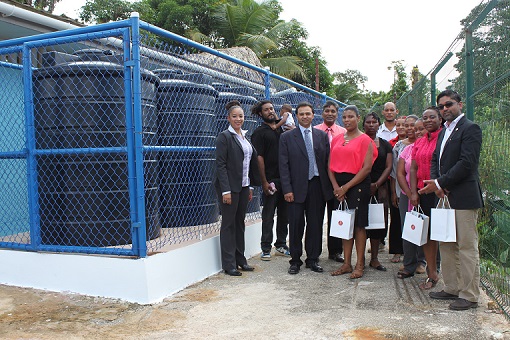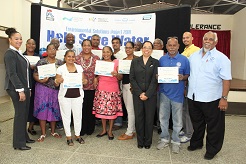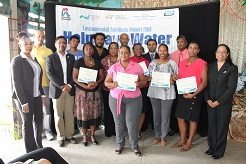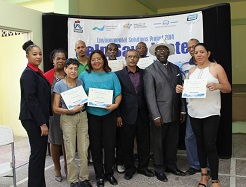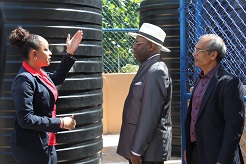Residents of Guaico stand alongside the storage tanks of their new rainwater harvesters at the Jubilee Presbyterian School. In attendance were Lovaan Superville, Senior Projects Officer, NIHERST, Andre Thompson, Board Member NIHERST and Collin Partap, Member of Parliament for Cumuto/Manzanilla.
Communities in Guaico, Biche and Lopinot are the latest to benefit from a NIHERST project that blends new technologies with traditional habits for harvesting rainwater. Led by NIHERST, official handover ceremonies at these three communities celebrated the installation of specially designed rainwater harvesting systems at the Jubilee Presbyterian Primary School in Guaico/Tamana, the Biche Community Centre, Biche and the Lopinot Community Centre, Lopinot. As part of NIHERST’s ongoing Environmental Solutions for Sustainable Communities Project, 16 schools and two community centres across 8 water scarce communities have thus far been outfitted with these rainwater harvesters.
Developed by the Global Water Partnership-Caribbean (GWP-C), with the support of the Caribbean Environmental Health Institute (CEHI) these harvesters are constructed using affordable, readily accessible materials. Installations are accompanied by public education programmes on water conservation and training for community members on the science behind rainwater harvesting, maintenance procedures and entrepreneurship carried out in partnership with the Ministry of Community Development, the Water Resources Agency (WRA) and the GWP-C.
At the handover ceremony held at the Lopinot Community Center, Dianne Wells, Senior Consultant at Options Plus and one of the coordinators of the programme, proudly described the project as an important step towards achieving water security in Trinidad and Tobago. Emphasizing the critical nature of the programme, Wells said, “What we are trying to do is ensure that the present remains one in which people are adequately supplied with the basic amenities for life.” Feature speaker at the ceremony Dr. the Honourable Lincoln Douglas, echoed these sentiments maintaining the importance of water resources in the future. Describing the project as “heartening”, Minister Douglas expressed his appreciation for the benefits expected to come to the community of Lopinot and its surrounding villages.
Community members have since reported better access to sanitary rainwater for daily uses, helping them to conserve potable supplies.




